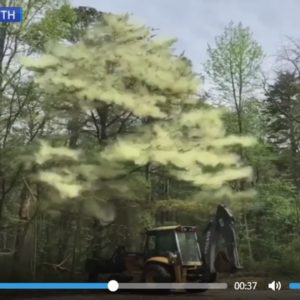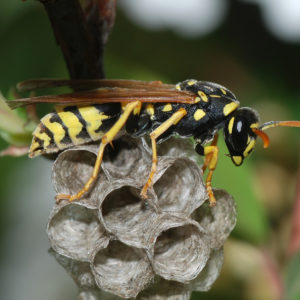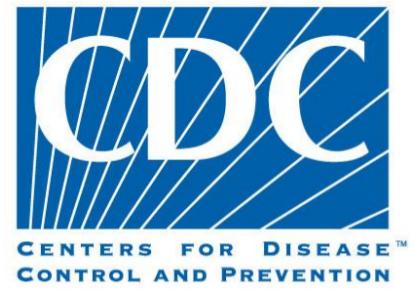Uncategorized

May 10, 2018. Nothing To Sneeze At – “Extreme” Tree Pollen, Allergy Misery & the NJ Pollen “Storm” Video
Nothing To Sneeze At: Extreme Tree Pollen Storm Video
Mount Laurel, NJ – May 10, 2018 – Yellow pollen is coating the Delaware Valley, and The Asthma Center board-certified allergists are happy to provide their expertise on this year’s unusually “extreme” tree pollen season, allergy misery, and video everyone’s talking about: The Millville, NJ Pollen “Storm Video” shared on Facebook and with 6ABC Philadelphia.
Pollen Storm Video (Pollen Bomb Video from Millville, NJ)
According to The Asthma Center’s board certified allergist, Dr. Marc Goldstein, this video (filmed by Jennifer Henderson of her husband Eric at work Monday 5/7/2018 in Cumberland County) illustrates in a dramatic way the abundance of pollen that one pine tree can produce and release. While this “pollen storm” may not happen for every tree, the video does show quite vividly the threat to allergy sufferers over the two to four week period when any given tree may release this much pollen.
Pollen grains are tiny and invisible to the naked eye. Trees, including pine trees which are ramping up their pollen production now, produce millions of pollen grains each season.
“Extreme” Tree Pollen for the Delaware Valley
For more than three decades, The Asthma Center’s Dr. Donald Dvorin has been monitoring the air in our region and is the only official pollen and mold spore counter certified by the National Allergy Bureau.
According to Dr. Dvorin, we are seeing “extreme” levels of tree pollen in our area which peaked around May 4, 2018. However, tree pollen levels have remained elevated (above 1000 tree pollen grains per cubic meter of air/24 hrs) for nearly every day since. Further, Dr. Dvorin reports that, compared to last year (spring 2017), tree pollen was delayed approximately 10 days because of March’s wintery weather and snow as well as “chilly” days in April.
“This time last year, we were almost done with all the pollen, but this year, we are much later than we usually are, and we are seeing it last a lot longer,” says Dr. Dvorin.
Dr. Dvorin also cautions that Pine pollen (Scrub Pine or Pitch Pine pollen from the NJ Pinelands makes our region unique from an allergy perspective), is just “taking off” and may not peak until the end of May – beginning of June. Stay informed – The Asthma Center provides daily counts, Monday – Friday, and you can follow our local pollen counts on our website, Facebook page, and direct to your inbox by subscribing for free here.

Spring Allergy Misery: Allergy Survival Tips
All of the board certified Allergists of The Asthma Center report that this appears to be a particularly difficult spring for allergy sufferers.
From The Asthma Center allergists, we have collected 5 tips beyond the conventional wisdom that can significantly reduce pollen exposure, especially on “bad pollen” days, and hopefully help you keep “merry for the month of May!”
1. Wash your face, particularly the eyebrows, after being outdoors. Microscopic pollen grains can cling to eyebrows and skin. Just like it’s important during flu season to wash your hands to prevent flu symptoms, frequently washing your face and eyebrows after being outdoors can prevent eye and nasal allergy symptoms.
2. Wash your hair before going to bed at night after extended time spent outdoors and change pillowcases frequently. Hair can be a magnet for microscopic pollen grains and mold spores, especially when extended time is spent outdoors. For those who are allergic, washing your hair (or your children’s hair) and changing pillowcases frequently can reduce exposure during sleep and help reduce morning allergy flares.
3. Avoid wearing contact lenses or switch to daily disposable contacts to avoid allergens building up on the lenses. Pollen and other allergens as well as environmental irritants can all buildup on contact lenses leading to increased eye allergy symptoms during the peak season. Switching to eyeglasses or daily disposable contacts will help avoid this common exposure. Wear “wrap-around” sunglasses when outside for more eye protection from pollen particles.
4. Beware of tracking pollen, particularly grass pollen into your home. Overlooked sources that may “sneak” pollen into the home include kids’ shoes and clothing, pets especially after playing outside in the grass, and morning newspaper sleeves.
5. Change air filters frequently for both your home and car. During the peak allergy season, pollen can build up rapidly on air filters and then be distributed through ventilations into both homes and cars. Use the highest allergen filter available and change filters frequently to reduce this risk.
Antihistamines Not Enough Allergy Relief?
If reducing your exposure to pollen in combination with over-the-counter antihistamines and nasal sprays don’t work on your symptoms, it’s still not too late to get relief. A board-certified Allergist can help.
At The Asthma Center, our allergists and pediatric allergists help our patients manage their allergies by determining what local spring allergens cause symptoms. For example, with spring allergies, we identify which local trees (including Oak, Pine, Mulberry and Birch) and grasses trigger allergy symptoms by using minimally invasive in-house diagnostics, like allergy skin testing. Pairing these results with local knowledge of allergy triggers like pollen, ragweed and mold, our allergists develop personalized plans that treat not only the symptoms but also the cause of allergies. And because allergy symptoms often spike with pollen, we know exactly when to adjust allergy medication – providing more relief when conditions are bad and less medication every time else.
Our allergists, pediatric allergists, and asthma specialists treat patients in 9 convenient locations throughout the Delaware Valley.
The National Allergy Bureau is a nonprofit organization affiliated with the American Academy of Allergy, Asthma, and Immunology that oversees and certifies pollen counting stations across the US. The Asthma Center operates the only certified pollen and mold stations in the Delaware Valley, with one location in Philadelphia and the other in South Jersey (Mount Laurel, NJ). You can follow our local pollen counts on our website, Facebook page, and direct to your inbox by subscribing for free here.
The Asthma Center is the Delaware Valley’s Official Pollen and Mold Spore Count Station
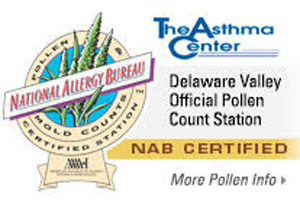
Ask about our Special Spring Saturday Hours for New Patients (available in selected locations)!
PA: (215) 569-1111 ![]() NJ: (856) 235-8282
NJ: (856) 235-8282
Center City Philadelphia • Society Hill Philadelphia • Northeast Philadelphia
The Main Line – Bala Cynwyd PA
Mt. Laurel NJ • Woodbury NJ • Hamilton – Princeton NJ • Forked River NJ
For interviews and tours of the Delaware Valley’s only certified pollen and mold spore stations for the National Allergy Bureau (NAB) certified pollen, ragweed, and mold spore counting stations in Philadelphia, PA and Mt. Laurel, NJ, please email gwoodlyn@asthmacenter.com. The health information contained in this article is meant for basic informational purposes only. It is not intended to serve as medical advice, substitute for a doctor’s appointment or to be used for diagnosing or treating a disease. If interested in purchasing historical pollen and mold spore counts, please email gwoodlyn@asthmacenter.com for information.
More Info
March 1, 2018. Spring Pollen Season Is Coming to Philadelphia
Dr. Donald Dvorin counts spring pollen at The Asthma Center’s Philadelphia pollen counting station.
Spring pollen season is right around the corner! With warming temperatures, we are only a week or two away from the start of spring pollen, with the first pollen expected from juniper, cedar, maple and elm trees. At the moment, cold evenings are preventing most tree buds from opening and thus holding off the release of pollen. As the weather warms, we will see a surge in pollen as trees across the region start to bloom. Locations further south (e.g. Florida, Carolinas) have already reported high levels of pollen, and as the Philadelphia region warms, we expect to be the next in line.
Local Daily Pollen Counts
At The Asthma Center, we count the local pollen every day and provide that count to the community. We use a pollen counting device called a Burkard Spore Trap Device, which samples the air by trapping pollen and other airborne molecules on a greased slide. Every morning, we remove the slide and examine it under a microscope. Different plant pollens have unique shapes, so we can count how much of each plant pollen is on the slide and use that metric to determine the daily pollen count.
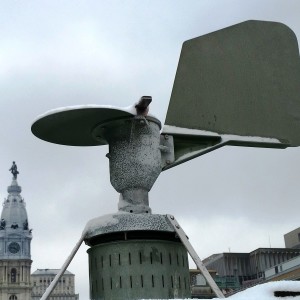
Philadelphia’s Only Certified Pollen/Mold Counting Station
The National Allergy Bureau is a nonprofit organization affiliated with the American Academy of Allergy, Asthma, and Immunology that oversees and certifies pollen/pollen counting stations across the US. The Asthma Center operates the only certified pollen/mold stations in the Delaware Valley, with one location in Philadelphia and the other in South Jersey-Mount Laurel, NJ.

You can follow our local pollen counts on our website, Facebook page, and direct to your inbox by subscribing for free here.
The Asthma Center is the Delaware Valley’s Official Pollen Count Station.
PA: (215) 569-1111 ![]() NJ: (856) 235-8282
NJ: (856) 235-8282
Center City Philadelphia • Society Hill Philadelphia • Northeast Philadelphia
Mt. Laurel NJ • Woodbury NJ • Hamilton – Princeton NJ • Forked River NJ
For interviews and tours of the Delaware Valley’s only certified pollen and mold spore stations for the National Allergy Bureau (NAB) certified pollen, ragweed, and mold spore counting stations in Philadelphia, PA and Mt. Laurel, NJ, please email gwoodlyn@asthmacenter.com.
If interested in purchasing historical pollen and mold spore counts, please email gwoodlyn@asthmacenter.com for pricing information.
More Info
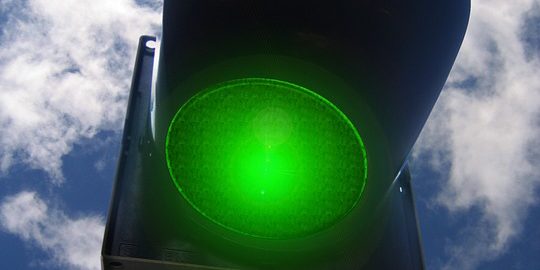
January 30, 2018. Black Box Warning Removed From Asthma Medications
FDA Removes Black Box Warning on Asthma Medications
Patients taking Breo, Advair, Symbicort, Dulera & AirDuo Can Breathe Easier
The Food and Drug Administration (FDA) has recently announced the removal of the Black Box Warning for asthma medications containing both inhaled steroids (ICS) and long-acting bronchodilators (LABA). Specifically, the following label will be removed from products including Breo, Advair, Symbicort, Dulera, AirDuo, and the generic product salmeterol/fluticasone.

“Black Box Warning” for Asthma Medications – The Back Story:
A “Black Box Warning” is the most severe FDA warning of serious hazards for medications and is found on the medication’s labeling and/or packaging insert.

In 2003, the safety of ICS/LABA products was called into question after the analysis of an asthma study called Salmeterol Multicenter Asthma Research Trial (SMART.) The SMART study showed a statistically significant increased risk of asthma-related deaths in patients on salmeterol (LABA.) At that time, the FDA mandated label changes in all products containing LABAs used for asthma but not COPD. The allergists at The Asthma Center and other asthma specialists have known for years that LABA when used in combination with ICS did not lead to increased risk of asthma-related deaths, but LABAs alone, without inhaled steroids, were still of concern. Further vigorous research studies, including those done at The Asthma Center, have shown that the risk of serious asthma-related events was no greater with ICS/LABAs than with ICS alone and that there was a low number of hospitalizations and no asthma-related deaths occurring in the ICS/LABA combinations. Consequently, the FDA has announced formally that there is no risk for asthma-related deaths, and the “black box warning” has now been removed from ICS/LABA combinations. We applaud the FDA for catching up with the clinical data that has been known for years in regard to safety of ICS/LABAs and that this should give more comfort to patients who are using these products on a chronic basis.
How The Asthma Center Can Help
The board-certified asthma specialists at The Asthma Center are the Delaware Valley’s leading experts on treating patients with asthma. With advanced in-office diagnostics, our asthma specialists are trained to correctly diagnosis and treat asthma symptoms and flares. Working with each patient individually, our allergists create a personalized asthma treatment plan to prevent and treat asthma. The board-certified asthma specialists at The Asthma Center treat patients in 9 convenient locations throughout the Delaware Valley.
Call now to schedule your appointment!
PA: (215) 569-1111 ![]() NJ: (856) 235-8282
NJ: (856) 235-8282
Center City Philadelphia • Society Hill Philadelphia • Northeast Philadelphia
Mt. Laurel NJ • Woodbury NJ • Hamilton – Princeton NJ • Forked River NJ
For questions regarding the removal of the black box warning for ICS/LABA medications, please email Gaille at gwoodlyn@asthmacenter.com. The health information contained in this article is meant for basic informational purposes only. It is not intended to serve as medical advice, substitute for a doctor’s appointment or to be used for diagnosing or treating a disease.
More Info
December 4, 2017. Christmas Tree Allergies – Bah Hum “Bugs”, Not Really
Don’t let Christmas Tree Allergies ruin “the most wonderful time of the year!” The Asthma Center’s Dr. Marc Goldstein shares his tips on how to keep your holidays free of sneezing & wheezing!
Christmas Tree Allergies & Asthma – Tips from Dr. Goldstein
Top 5 Tips to Avoid Christmas Tree Allergies & Asthma
- Clean Your Christmas Tree. Before you bring your Christmas tree inside, be sure to shake it out and rinse it off with a hose! With fresh cut trees, pay special attention to the bottom of the tree because this is where the most pollen, dirt and mold are found. With artificial trees, dust which may have collected throughout the year can be a potential allergy & asthma trigger as well, so be sure to clean these trees before decorating.
- Dust and Clean ornaments, wreathes, and garlands before decorating. As with Christmas trees, dust on ornaments can trigger symptoms as well.
- Avoid scented candles, pot pourri and aerosol sprays.
- Avoid fireplaces, ash & smoke–this can present particular problems for those with asthma.
- Avoid touching wreathes, garlands and trees if you have sensitive skin or severe allergies (which can result in contact dermatitis.)
Christmas Tree Bugs
A recent report from the pest control company Safer Brand estimates that a single Christmas tree could be infested with thousands of bugs including aphids, spiders and mites, bark beetles, praying mantises, and more! While unwanted and perhaps unpleasant, these microscopic insects are not health threats. To avoid, Safer Brand recommends letting fresh trees sit inside your garage for at least one day before bringing it inside. Additionally, some individuals find it helpful to spray your Christmas Tree with the organic Safer Brand’s End All neem oil which kills bugs in all stages (from eggs to adults). More information is available from Safer Brand on Christmas Trees and bug prevention.
How Allergists Can Help
Board-certified allergists and pediatric allergists help patients minimize Christmas allergies, asthma, and sinus problems. Using minimally invasive in-house diagnostics, like allergy skin testing, needle-free allergy skin testing, and breathing tests, and knowledge of local allergy triggers like dust, pine tree pollen, ragweed and mold, our allergists develop personalized plans that treat not only the symptoms but also the cause of allergies. Several treatment options, including allergy immunotherapy, are effective and non-drowsy solutions. The board-certified allergy and asthma specialists at The Asthma Center treat patients in 9 convenient locations throughout the Delaware Valley.
Call now to schedule your appointment!
PA: (215) 569-1111 ![]() NJ: (856) 235-8282
NJ: (856) 235-8282
Center City Philadelphia • Society Hill Philadelphia • Northeast Philadelphia
Mt. Laurel NJ • Woodbury NJ • Hamilton – Princeton NJ • Forked River NJ
For questions regarding Christmas Allergies & Asthma, please email Gaille at gwoodlyn@asthmacenter.com. The health information contained in this article is meant for basic informational purposes only. It is not intended to serve as medical advice, substitute for a doctor’s appointment or to be used for diagnosing or treating a disease.
More Info
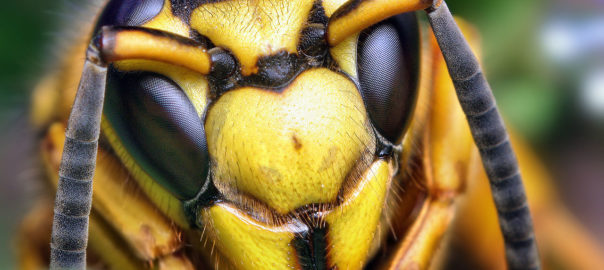
October 19, 2017. Bee Sting Allergy – Yellow Jackets on Steroids?
Bee Sting Allergy Alert – Yellow Jackets on Steroids?
Through the warmer months from early Spring through late Autumn, those with bee sting allergy are at risk for sting reactions. This time of year, though, is particularly troublesome for those with yellow jacket allergies. Yellow jackets typically nest in the ground under natural and man-made structures. Common places include roof eves, tree stumps, under bushes and in depressions in the ground. Yellow jackets tend to be very aggressive this time of year when their populations are high and food supplies are low. Yellow jacket stings are, therefore, particularly more likely this time of year—particularly if sting allergic individuals are eating outside.
Yellow Jacket Sting Allergy
Yellow jacket sting reactions can range from local to generalized skin swelling to a severe allergic reaction (anaphylaxis) including: blood pressure drop, difficulty breathing and skin swelling. For those with reactions, appropriate evaluation by a board certified allergist with allergy skin test to bee venom is appropriate to determine bee venom allergies and determine if the risk for severe reactions can be minimized by allergy injections.
Top Tips to Avoid Yellow Jacket Stings
For those with yellow jacket allergies, the following precautions should be followed:
- Minimize time spent outside eating
- Avoid wearing bright colored clothing outside which tends to attract yellow jackets
- Have your property inspected for yellow jacket paper nests in the ground, under plant growth and under roof eves.
- Always carry your epinephrine autoinjector when outside.
- Wear shoes outside at all times.
- Wear fitted clothing. Yellow jackets and other insects may become trapped in over-sized or loose, flowing clothes.
- Stay still when an insect is approaching. Never slap at an insect. Insects will not sting unless frightened or antagonized, so stay as calm and relaxed as possible.
- Avoid wearing scents, such as perfumes, hair sprays and suntan lotions, which often attract insects. Keep foods and/or drinks covered while outside as these aromas may also attract insects.
How Allergists Can Help
The board-certified allergists at The Asthma Center are the Delaware Valley’s leading experts on treating patients with bee sting reactions and allergies. With advanced in-office diagnostics, our asthma specialists are trained to correctly diagnosis and treat symptoms that otherwise limit performance and comfort. Working with each patient individually, our allergists create a personalized Bee Sting treatment plan to prevent and treat bee sting reactions. The board-certified asthma specialists at The Asthma Center treat patients in 9 convenient locations throughout the Delaware Valley.
Call now to schedule your appointment!
PA: (215) 569-1111 ![]() NJ: (856) 235-8282
NJ: (856) 235-8282
Center City Philadelphia • Society Hill Philadelphia • Northeast Philadelphia
Mt. Laurel NJ • Woodbury NJ • Hamilton – Princeton NJ • Forked River NJ
For questions regarding bee sting allergy, please email Gaille at gwoodlyn@asthmacenter.com. The health information contained in this article is meant for basic informational purposes only. It is not intended to serve as medical advice, substitute for a doctor’s appointment or to be used for diagnosing or treating a disease.
More Info

October 4, 2017. Vitamin D: A New Treatment for Asthma?
A new study published yesterday in The Lancet Respiratory Medicine journal concluded that Vitamin D shows promise as a safe and effective treatment for asthma.
The Asthma Center’s Dr. Marc Goldstein reviews this groundbreaking research and what it means for you.
The “Sunshine Vitamin” – Vitamin D
Vitamin D, also known as the “sunshine vitamin” because the sun stimulates the skin to make vitamin D, has been known for years to be important in bone health. Vitamin D is actually a fat-soluble hormone. In addition to Vitamin D receptors on cells in bones and in the small bowel which help with calcium absorption, it turns out that most human cells have Vitamin D receptors. This makes many cell types and tissues vulnerable to the effects of Vitamin D.
The potential beneficial effects of Vitamin D on the immune system are so important that thousands of studies have been conducted on more than 100 different medical disorders from asthma, allergic rhinitis, chronic obstructive pulmonary disease (COPD), cancer, diabetes to multiple sclerosis and depression.
Study Highlights: Promising New Asthma Treatment
The most recent study related to asthma was published October 3, 2017 in The Lancet Respiratory Medicine journal. The study was a review of 7 randomized controlled studies involving 955 subjects with asthma on standard conventional treatments. The study looked at the effect of taking Vitamin D supplements on asthma severity. Three important results were reported from this new research:
- People with asthma who took Vitamin D supplements as part of their asthma treatment plan were 50% less likely to go to the emergency room or be admitted to the hospital for asthma flares than those who did not take Vitamin D supplements.
- Taking Vitamin D was linked with needing less glucocorticosteroids following an asthma attack (either injection or tablet form).
- Patients whose Vitamin D levels were “low” at the beginning of the study experienced the greatest benefit from taking Vitamin D supplements. For these patients, their use of glucocorticosteroids with asthma flares decreased by more than half (55%).
Vitamin D For Asthma Patients
Previous research has demonstrated that low Vitamin D levels in asthma patients are associated with
- impaired lung function
- increased airways hyperreactivity, and
- reduced response to glucocorticosteroids.
Low Vitamin D levels in utero and/or early on in life has been associated with increased risk of developing asthma.
If these new conclusions are reproduced in larger studies, Vitamin D may be an inexpensive and safe over-the-counter (OTC) supplement that may improve asthma severity, improve treatment responsiveness and reduce asthma exacerbations.
Questions to Ask Your Asthma Specialist
Here are a set of questions that we recommend that you discuss with your asthma specialist:
- Could Vitamin D deficiency be playing a role in your symptoms of coughing, wheezing, shortness of breath and/or flares of asthma?
- Should you be tested for Vitamin D deficiency?
- Should you take Vitamin D supplements (are you a candidate to try this new treatment approach)?
- What are the best choices for treatment with Vitamin D supplements?
The Asthma Center
The board-certified physicians at The Asthma Center are Delaware Valley’s leading experts on treating patients with asthma. With advanced in-office diagnostics, our asthma specialists are trained to correctly diagnosis and treat symptoms that otherwise limit comfort and health. Working with each patient individually, our asthma specialists can create a personalized asthma treatment plan to propel our patients forward.
The board-certified asthma specialists at The Asthma Center treat patients in 9 convenient locations throughout the Delaware Valley.
Call now to schedule your appointment!
PA: (215) 569-1111 ![]() NJ: (856) 235-8282
NJ: (856) 235-8282
Center City Philadelphia • Society Hill Philadelphia • Northeast Philadelphia
Mt. Laurel NJ • Woodbury NJ • Hamilton – Princeton NJ • Forked River NJ
For questions or media inquiries, please email Gaille at gwoodlyn@asthmacenter.com. The health information contained in this article is meant for basic informational purposes only. It is not intended to serve as medical advice, substitute for a doctor’s appointment or to be used for diagnosing or treating a disease.
More Info
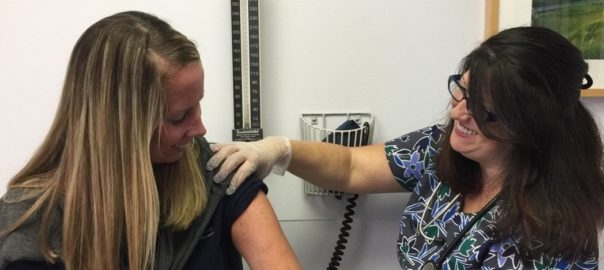
September 28, 2017. How to Avoid the Flu This Year? Get the Flu Shot That’s Right For You
The Asthma Center physicians and staff get flu shots too! In the above picture taken in The Asthma Center’s Woodbury, NJ office, Clinical Supervisor Sandy Richards, RN administers the quadrivalent flu shot to Medical Secretary Michelle Wood! (Courtesy: staffer Shannon Cephas, LPN)
Flu Season 2017 is Here
According to the Centers for Disease Control and Prevention, flu shots are recommended for everyone 6 months and older. The flu vaccine is one of the most important steps you can take to prevent getting the flu. With several different flu vaccines available, here’s a guide to which option is best for you.
Flu FAQ: Not All Flu Shots are Created Equal
- Four is Better Than Three (for everyone under age 65)
The Asthma Center highly recommends the quadrivalent (4 strain) influenza vaccine for all patients under the age of 65 years. The quadrivalent vaccine contains the four most common types of the influenza virus versus only three types in the older trivalent (3 strain) vaccine and provides the most complete protection for this age group against the flu this winter.
- Three with Extra Power (for everyone age 65 and older)
The Asthma Center highly recommends the high potency trivalent (3 strain – high potency) influenza vaccine for all patients 65 years and older . This is the vaccine administered by our practice because it provides the most complete flu protection for this age group. Note that this is superior to the standard trivalent vaccine.
- Buyer Beware – Not All Flu Shots Are The Same
Many local pharmacies and other medical facilities have continued to administer the inferior (less expensive) trivalent influenza vaccine when a patient asks for a “flu shot”. Be sure to ask for the quadrivalent formulation or the high potency trivalent.
- What Parents Need to Know
Children are a particularly vulnerable group when it comes to the flu. The Centers for Disease Control and Prevention (CDC) recommends that everyone 6 months and older get the flu shot every flu season.

- What about Nasal Spray Flu Vaccines?
Though it is FDA approved, the CDC is not recommending the FDA approved nasal spray vaccine (FluMist) this year because of concerns about how well it works. For the 2017-2018 flu season, the CDC only recommend injectable flu shots!
- What if My Child is Afraid of Needles?
The Asthma Center physicians and staff have years of experience in providing the best care including vaccines, allergy shots, and allergy skin testing to children of all ages, including those who are afraid of needles. We know that no two individuals are alike, and we take pride in tailoring and providing personalized care in a safe, comfortable, and compassionate environment.
- Experience & Customized Care
At The Asthma Center, we personalize your experience by choosing the form of the influenza vaccine that is right for you – multiple doses for young children (if necessary), preservative-free for those with preservative sensitivities, high-dose for those over 65 years of age and the quadrivalent vaccine for those not requiring alternative formulations. And, most importantly, we are there for you in the unlikely event you experience an adverse reaction to the vaccine.
Did you know that you should wait for 30 minutes after administration of any vaccine so that if an immediate severe reaction (anaphylaxis) occurs, you can be immediately treated?
- Can You Have a Reaction to the Flu Shot?
Unlikely, but yes!
At The Asthma Center, our board-certified allergists and highly trained staff are well equipped to handle adverse reactions. All of our physicians and staff are trained to recognize and treat reactions to any vaccine, including the flu shot.
- The Asthma Center Flu Shots are Available for Everyone
The Asthma Center provides flu shots available for everyone aged 6 months and older, not just current patients.
Call now to schedule your flu shot appointment!
Center City Philadelphia • Society Hill Philadelphia • Northeast Philadelphia
Mt. Laurel NJ • Woodbury NJ • Hamilton – Princeton NJ • Forked River NJ
For questions regarding flu shots, please email Gaille at gwoodlyn@asthmacenter.com. The health information contained in this article is meant for basic informational purposes only. It is not intended to serve as medical advice, substitute for a doctor’s appointment or to be used for diagnosing or treating a disease.
More Info
September 13, 2017. Play with the Pros: Sports Asthma
Do You Have Exercised-Induced Asthma?
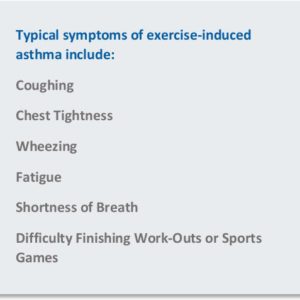
Coughing, wheezing, shortness of breath or chest tightness while exercising or after? These are all typical symptoms of exercise-induced or sports asthma.
Vigorous exercise is one of the most common causes of bronchospasm (difficulty breathing) that can affect individuals of any age and fitness level. Factors contributing to exercise-induced asthma include the intensity of activity, control of underlying chronic asthma, environmental temperature & humidity, and even local air pollution. Though present in adults, sports asthma is most frequently diagnosed in children and young adults, who are more likely to engage in strenuous activity.
Interestingly, the type of exercise directly affects the intensity and duration of an exercised-induced asthma episode. Sustained hyperpnea (deep, rapid breathing during intense, prolonged aerobic activity) – often experienced while running – will be more likely to induce asthma than a sport that produces intermittent bursts of activity, such as baseball or tennis. Activities such as bike-riding and swimming are less likely to induce sports asthma than running. Swimming appears to be the least inducing sport, which may in part be related to the inhalation of humidified air (an exception to this might be exposure to chlorine and other chemicals which may act as a trigger of asthma symptoms). Intense exertion will also produce more severe symptoms when cold air is inhaled – this might occur in outdoor winter sports, like skiing or snowboarding, or in an ice rink.
Do Professional Athletes Have Sports Asthma?
Yes! In fact since 2000, Olympic athletes with asthma have won significantly more medals than athletes without asthma!
According to a 2016 study* published to accompany the Rio Summer Olympics, asthma is the most common chronic condition among Olympic athletes. The rate of asthma has increased in recent decades, especially among endurance sports like athletes who participate in swimming, cycling, rowing, and long-distance running. Olympic athletes have the same risk of developing asthma as the general population.
This recent study found that “…asthma develops in endurance athletes and is believed to be related to daily training sessions and frequent competitions with heavily increased ventilation.” Interestingly, the study also found that in Olympic games since 2000, asthmatic athletes won substantially more medals than athletes without asthma and quoted speculation that “…the harder an athlete trains, the better the performance, simultaneously increasing asthma risk.” In fact, Mount Holly NJ native and swimmer Kelsi Worrell won a gold medal in the 4 x 100 meter medley relay in the 2016 Olympics!

Tips for Athletes with Sports Asthma
For athletes of all ages and skill-levels:
Know your triggers. If symptoms occur most often during strenuous activity in cold, dry air, one may need to exercise indoors during the winter or wear a scarf or warming face mask when exercising outside. Allergen-sensitive individuals should consider adjusting exercise routines during high-pollution and high-allergen days. Do not exercise when you feel fatigued or have a cold or other illness known to trigger your asthma.
Practice prevention. Improved physical conditioning has been shown to decrease the incidence of asthma attacks. For this reason, those with asthma are encouraged to continue exercising. The following measures can help prevent an exercise-induced asthma attack:
- Warm up and cool down effectively. Gradually slowing down activity after intense exertion often helps limit post-exercise symptoms of sports asthma.
- Drink plenty of fluids throughout the day, not just during exercise.
- Utilize indoor practice facilities that offer good ventilation and air conditioning. Especially in extremely cold weather, consider exercising indoors.
- If you smoke, quit.
- If you have seasonal allergies, schedule practices when pollen counts are lowest (evening is best). And consider immunotherapy (allergy shots) to reduce symptoms.
- Avoid air pollution that might be present in ice rinks, swimming pools, indoor facilities.
- Regular follow-up examinations with your physician.
Pre-Treatment. The single most important thing to remember is to always keep an inhaler handy. Athletes often use an inhaler 10-20 minutes before exercise. Generally, using an inhaler once before, and once during exercise is no cause for concern. However, using an inhaler more frequently during a session could indicate unstable asthma. Please discuss with your physician.
Special Tips for Parents
Physical activity is especially important for children. Having a Sports Asthma Action Plan is essential to making sure that students and athletes can safely participate in all athletic activities. To avoid potential misunderstandings and/or delay in treatment, make sure there is clear communication of the Sports Asthma Action Plan between children, parents, coaches, teachers, and school nurses. Understanding and communicating the Sports Asthma Action Plan is crucial in managing sports asthma for kids and can include pre-exercise treatment, maintenance treatment, warm-up or cool-down exercises, conditioning, and access to quick-relief medications. Please contact your asthma specialist with any questions.

The Asthma Center Can Help
The board-certified physicians at The Asthma Center are Delaware Valley’s leading experts on treating patients with asthma. We treat many of Philadelphia’s active and retired professional athletes, and we help many of our adult and children patients lead active lifestyles. With advanced in-office diagnostics, our asthma specialists are trained to correctly diagnosis and treat symptoms that otherwise limit performance and comfort. Working with each patient individually, our asthma specialists can create a personalized sports asthma treatment plan to propel our patients forward.
The board-certified asthma specialists at The Asthma Center treat patients in 9 convenient locations throughout the Delaware Valley.
Center City Philadelphia • Society Hill Philadelphia • Northeast Philadelphia
Mt. Laurel NJ • Woodbury NJ • Hamilton – Princeton NJ • Forked River NJ
The health information contained in this article is meant for basic informational purposes only. It is not intended to serve as medical advice, substitute for a doctor’s appointment or to be used for diagnosing or treating a disease. For interviews and tours of the Delaware Valley’s only National Allergy Bureau (NAB) certified pollen, ragweed, and mold spore counting stations in Philadelphia, PA and Mt. Laurel, NJ, please email gwoodlyn@asthmacenter.com
*Source: J Allergy Clin Immunol 2016:138:409-10
More Info
August 15, 2017. Can Allergies Make You Drowsy Enough to Impair Driving?
The Asthma Center’s Board Certified Allergists Review New Research On How Allergies Impair Driving: Study Published in the August issue of the American Journal of Allergy and Clinical Immunology.
New Study: Allergies Increase the Risk of Driving Accidents
Drowsiness and lack of awareness can affect all drivers with studies revealing that 1 in 5 accidents is related to difficulty staying awake. Allergies can, and often do, impact an individual’s quality of life including problems with sleeping, daytime drowsiness, and trouble focusing. A new study published this August looked at how allergies impair driving and impact the risk of driving accidents.
Allergies Impair Driving
Nearly two-thirds (63.8%) of the patients reported that their allergies affected their driving.
Researchers surveyed more than 3800 people across the United States between the ages of 25 and 53 years old. Of the 63.8% who reported that allergy symptoms had an impact on their driving skills:
- Almost 20% reported that allergies had affected their ability to respond to a specific situation (that they did not have the correct reflex)
- Just under 15% reported allergies had contributed to an unusual driving error
- 9.5% reported falling asleep while driving (for a fraction of a second)
- 17.5% reported needing to pull off to the side of a road
- A little more than 15% reported occasions they felt unable to drive
- Less than 1% stated they were in a car accident due to allergies
Patients with the most severe allergic symptoms, who were most likely to be taking antihistamines by mouth and as eye drops experienced the most drowsiness and reported the most lack of focus and awareness while driving.
The Asthma Center’s board certified allergists, with more than four decades of experience with treating individuals for allergies, concur with the findings of this new study:
- Allergies increase the risk of driving accidents independent of medication
- Patients should be informed regarding this risk, and the need for following their personal Allergy Action Plan to minimize the risk. Patients should review their Allergy Action Plan with their board certified allergist every three months so that adjustments can be made as necessary.
- Further research should be pursued to more clearly define the relationship between allergies, drowsiness, and lack of focus and driving accidents
J Allergy Clin Immunol August 2017, 140 (2): 614-616
If one is driving, or planning in the short term to drive, avoiding sedating medications like over-the-counter Benadryl, chlorpheniramine, and others is essential.
Allergy injections are a non-sedating option and the most effective way to treat allergies and avoid the use of sedating medications.
A Board-Certified Allergist Can Help with Allergies
Board-certified allergists and pediatric allergists help patients minimize allergies, asthma, and sinus problems. Using minimally invasive in-house diagnostics, like allergy skin testing, needle-free allergy skin testing, and breathing tests, and knowledge of local allergy triggers like pollen, ragweed and mold, our allergists develop personalized plans that treat not only the symptoms but also the cause of allergies. Several treatment options, including allergy immunotherapy, are effective and non-drowsy solutions.
The allergists, pediatric allergists, and asthma specialists at The Asthma Center treat patients in 9 convenient locations throughout the Delaware Valley including Philadelphia (Center City Philadelphia, Society Hill Philadelphia, Northeast Philadelphia), The Main Line – Montgomery County (Bala Cynwyd – Lower Merion), Bucks County (Langhorne), and South Jersey (Mt. Laurel, Woodbury, Princeton – Hamilton, Forked River).
The health information contained in this article is meant for basic informational purposes only. It is not intended to serve as medical advice, substitute for a doctor’s appointment or to be used for diagnosing or treating a disease.
For interviews and tours of the Delaware Valley’s only National Allergy Bureau (NAB) certified pollen, ragweed, and mold spore counting stations in Philadelphia, PA and Mt. Laurel, NJ, please email gwoodlyn@asthmacenter.com
More Info

August 8, 2017. Red Meat Allergy and the Lone Star Tick in Metro Philly – Southern NJ
Philadelphia, PA – August 8, 2017 – “As the Lone Star tick population continues to grow in metropolitan Philadelphia and Southern New Jersey, so will the incidence of red meat allergy rise in our community. Red meat allergy also must be considered for our residents who have severe life-threatening reactions (anaphylaxis) with an unknown cause.” Dr. George Belecanech, Board-Certified Allergist at The Asthma Center
Watch Dr. Belecanech’s CBS3 Interview
Update on Red Meat Allergy and the Lone Star Tick in Metro Philly and Southern NJ
With the last of summer vacations and spending more time outdoors, we are all more susceptible to tick bites. By now, most of us are familiar with Lyme disease from deer ticks. But did you know that another tick variety prevalent in our area, the Lone Star tick, can trigger red meat allergy?
This red meat allergy is also known as alpha-gal allergy. Alpha-gal is a carbohydrate found in red meat including beef, pork, lamb and venison. Since 2009, Lone Star tick bites have been linked to the development of delayed allergic symptoms (usually 3-6 hours) following the ingestion of red meat. Individuals bitten by Lone Star ticks may develop allergy (IgE) antibodies to alpha-gal. Upon ingesting mammalian meat containing alpha-gal (red meat), delayed allergic symptoms can develop.
Interestingly, a typical allergic reaction to a food occurs in minutes, yet the red meat allergic reactions may take as long as three to six hours to set in. While the allergic reaction can be triggered by alpha-gal in red meat, it is also important to note that the alpha-gal reaction can be triggered by gelatins, cow’s milk, and Cetuximab, which is a treatment of colon cancer. However, the Alpha-gal carbohydrate is not found in poultry, such as chicken and turkey, or fish.
It is thought that individuals with blood types A or O are at increased risk of alpha-gal sensitization. However, the alpha-gal allergy has been seen among other blood types, as well. People of all blood types should exercise caution to avoid ticks and prevent this allergy from developing
Red meat allergy is generally considered to be uncommon in the United States, and was only recently recognized in 2009. However, the increased population of Lone Star ticks in our region increases the threat of red meat allergy. An essential part of any food allergy treatment program is avoidance, and triggers can be particularly difficult to identify. This is particularly true with Lone Star tick bites and red meat allergy because the allergic reaction is often delayed, thereby “hiding” the true cause of the allergic reactions.
The Asthma Center Board-Certified Allergists have put together the following guides to help recognize the signs and symptoms of red meat allergy caused by Lone Star tick bites.
Lone Star Tick Bite Facts
- The Lone Star female adult tick has a distinctive white dot. The Lone Star adult male, on the other hand, has markings similar to those of a “deer tick.”
- Lone Star tick bites often cause an extremely itchy rash around the bite within 7 days. Note: Tick bites related to Lyme Disease and other illness by contrast, may also develop a rash that feel warm to the touch but generally are not itchy.
- Some individuals may be unaware that they have experienced a tick bite.
- Lone Star tick bites do not usually cause Lyme Disease; however, Lone Star ticks feed on warm blooded mammals which may have Lyme Disease and other tick-borne illnesses. In rare cases, the Lone Star tick can become a “carrier” of these illnesses.
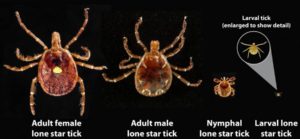
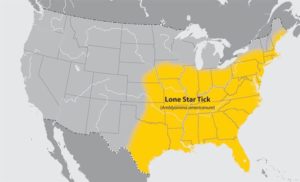
Lone Star Tick Bites and Food Allergy Symptoms
After a Lone Star tick bite, the following food allergy symptoms can occur with the ingestion of red meat (including beef, pork, lamb or venison):
- Hives or skin rash
- Nausea, stomach cramps, indigestion, vomiting, diarrhea
- Stuffy/runny nose
- Sneezing
- Headaches
- Asthma
- Anaphylaxis (life-threatening allergic reaction)
Red Meat Allergy Diagnosis and Treatment
At The Asthma Center, our allergists and pediatric allergists help our patients manage their food allergies by first determining what foods cause symptoms. Commercially available allergy skin tests for red meat (beef, pork, and lamb) are usually negative, but skin tests to fresh meat may be positive. When a meat allergy is causing any of the above symptoms, and a Lone Star tick bite is suspected, a blood test can help diagnosis this condition. Many cases of what has previously been diagnosed as “idiopathic anaphylaxis (where the cause is unknown) may actually be cases of red meat allergy. The delayed reaction caused by red meat allergy (which can occur 3-6 hours after eating red meat) is often misleading since most allergic food reactions occur within one hour of ingestion of the culprit food.
Avoidance of foods that trigger symptoms is a key part of living with red meat food allergy. The Asthma Center allergists pair these results and any other testing results which may apply to an individual’s unique history and set of symptoms to identify specific triggers. The Asthma Center allergists also help our patients find relief of symptoms with antihistamines and corticosteroids, and prepare for anaphylaxis by carrying epinephrine auto-injector to reverse severe reactions to any unforeseen exposure or accidental ingestion of a triggering food.
Tips for Tick Bite Avoidance
No tick bite is a “good” tick bite.
With a greater than usual tick population predicted for our region, increases in Lyme Disease which is spread by the “deer tick” (black legged tick) are not the only concern. It has been widely reported that a small percentage of deer ticks may also carry the Powassan virus.
Avoid Tick bites:
- Use repellent that contains 20 percent or more DEET, picaridin, or IR3535 on exposed skin for protection that lasts several hours
- Walk in the center of trails and avoid wooded and grassy areas
- Wear long sleeves, long pants and thick socks
- Learn more about preventing tick bites from the Centers for Disease Control
If you are concerned about a tick bite or other rash, please see a medical professional.
The allergists, pediatric allergists, and asthma specialists at The Asthma Center treat patients in 9 convenient locations throughout the Delaware Valley including Philadelphia (Center City Philadelphia, Society Hill Philadelphia, Northeast Philadelphia), The Main Line – Montgomery County (Bala Cynwyd – Lower Merion PA), Bucks County (Langhorne PA), and South Jersey (Mt. Laurel NJ, Woodbury NJ, Hamilton NJ, Forked River NJ).
The health information contained in this article is meant for basic informational purposes only. It is not intended to serve as medical advice, substitute for a doctor’s appointment or to be used for diagnosing or treating a disease.
For interviews and tours of the Delaware Valley’s only National Allergy Bureau (NAB) certified pollen, ragweed, and mold spore counting stations in Philadelphia, PA and Mt. Laurel, NJ, please email gwoodlyn@asthmacenter.com.
More Info

